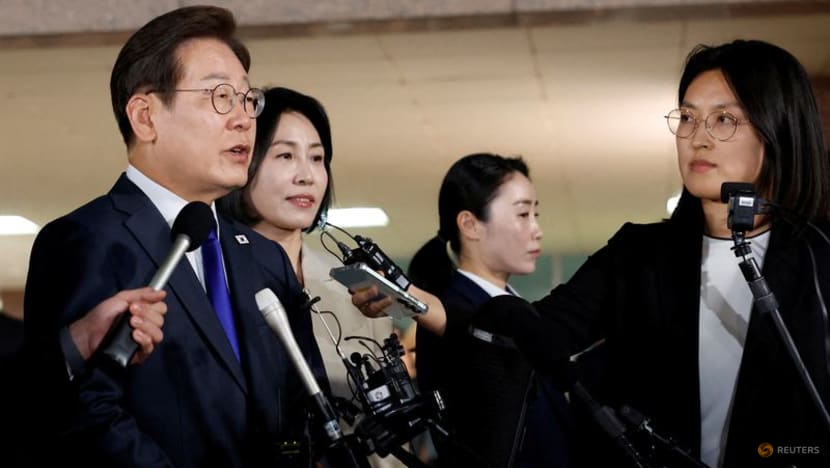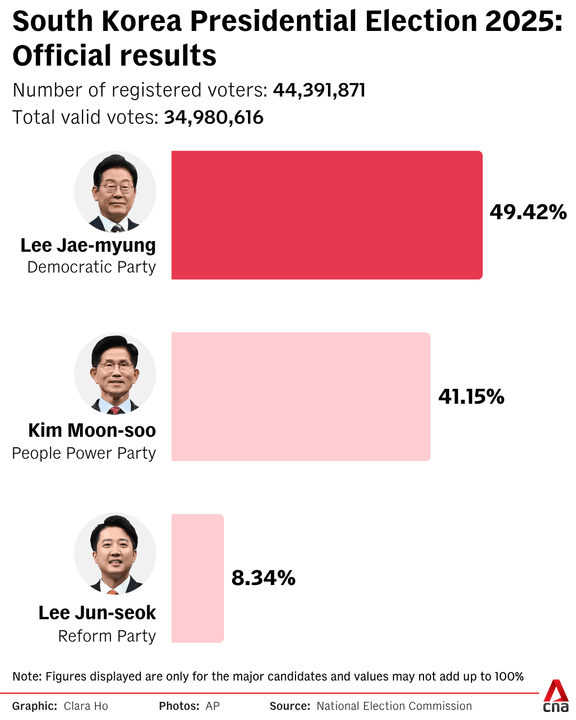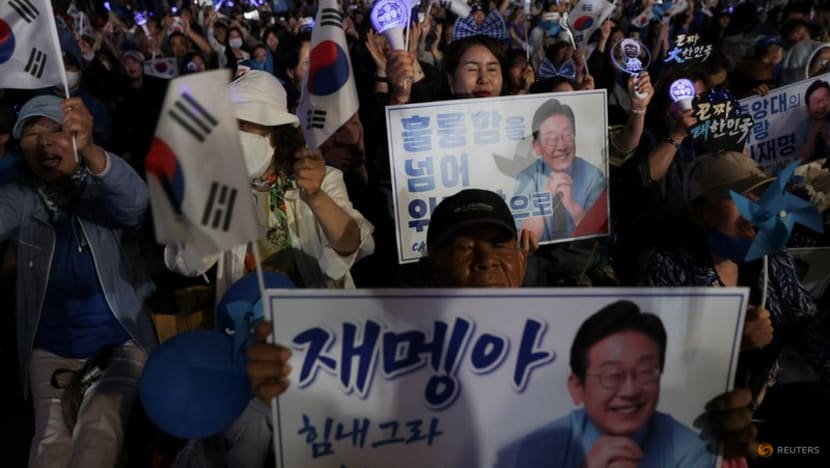Liberal Lee Jae-myung wins South Korea presidency in martial law 'judgment day'
Liberal Party candidate Lee Jae-myung's victory follows a backlash against Conservative leader Yoon Suk Yeol's declaration of martial law, which ultimately led to his removal as South Korea's President.

Lee Jae-myung, the presidential candidate for South Korea's Democratic Party, speaks as he leaves to meet his supporters, in Incheon, South Korea, Jun 3, 2025. (Photo: REUTERS/Kim Soo-hyeo)
SEOUL: South Korea's liberal party candidate, Lee Jae-myung, was elected president in Tuesday's (Jun 3) snap election, six months to the day after he evaded military cordons to vote against a shock martial law decree imposed by his ousted predecessor.
Lee's victory stands to usher in a political sea change in Asia's fourth-largest economy, after the backlash against the martial law brought down Yoon Suk Yeol, the conservative outsider who narrowly beat Lee in the 2022 election.
With 100 per cent of the ballots counted, Lee won 49.42 per cent of the nearly 35 million votes cast while conservative rival Kim Moon-soo took 41.15 per cent in the polls that brought the highest turnout for a presidential election since 1997, according to National Election Commission data.

The 61-year-old former human rights lawyer called Tuesday's election "judgment day" against Yoon's martial law and his People Power Party's failure to stop the ill-fated move.
"The first mission is to decisively overcome insurrection and to ensure there will never be another military coup with guns and swords turned against the people," Lee said in a victory speech outside parliament.
"We can overcome this temporary difficulty with the combined strength of our people, who have great capabilities," he said.
Lee was officially confirmed as president by the National Election Commission on Wednesday and immediately assumed the powers of the presidency and commander in chief.
An abbreviated inauguration is planned at parliament at 11am (10am Singapore), an interior ministry official said.
Lee also vowed to revive the economy and seek peace with nuclear-armed North Korea through dialogue and strength.
The martial law decree and the six months of ensuing turmoil, which saw three different acting presidents and multiple criminal insurrection trials for Yoon and several top officials, marked a stunning political self-destruction for the former leader and effectively handed the presidency to his main rival.
Yoon was impeached by the Lee-led parliament, then removed from office by the Constitutional Court in April, less than three years into his five-year term, triggering the snap election that now stands to remake the country's political leadership and foreign policies of a key US ally.
Lee has accused the PPP of having condoned the martial law attempt by not fighting harder to thwart it and even trying to save Yoon's presidency.
Kim was Yoon's labour minister when the former president declared martial law on Dec 3.
"I was here on Dec 3 after martial was declared and December 14 when Yoon was impeached," said Choi Mi-jeong, 55, a science teacher who gathered outside parliament to hear Lee speak. "Now Lee Jae-myung is becoming president. I hope he will become a leader who supports ordinary people, not vested interests, not a small number of riches."
A daunting slate of economic and social challenges awaits the new leader, including a society deeply scarred by divisions following the martial law attempt and an export-heavy economy reeling from unpredictable protectionist moves by the United States, a major trading partner and a security ally.
The government under a caretaker acting president had made little progress in trying to assuage crushing tariffs announced by US President Donald Trump's administration that would hit some of the country's major industries, including autos and steel.
"President Lee will find himself with little to no time to spare before tackling the most important task of his early presidency: reaching a deal with Trump," the Washington-based Center for Strategic and International Studies said in an analysis.
The White House said the election of Lee was "free and fair" but the United States remained concerned and opposed to Chinese interference and influence in democracies around the world, according to a White House official.
The alliance between the US and South Korea remains "ironclad," the official said.

NEED FOR CHANGE
Park Chan-dae, acting leader of Lee's Democratic Party, told KBS that the projections suggest voters rejected the martial law attempt and are hoping for an improvement in their livelihoods.
"I think people made a fiery judgment against the insurrection regime," he said.
The winner must tackle challenges including a society deeply scarred by divisions made more obvious since the attempt at military rule, and an export-heavy economy reeling from unpredictable protectionist moves by the United States, a major trading partner and a security ally.
Both Lee and Kim pledged change for the country, saying a political system and economic model set up during its rise as a budding democracy and industrial power are no longer fit for purpose.
Their proposals for investment in innovation and technology often overlapped, but Lee advocated more equity and help for mid- to low-income families while Kim campaigned on giving businesses more freedom from regulations and labour strife.
Lee is expected to be more conciliatory toward China and North Korea, but has pledged to continue the Yoon-era engagement with Japan.
Kim branded Lee a "dictator" and his Democratic Party a "monster," warning if the former human rights lawyer becomes president, nothing will stop them from working together to amend laws simply because they do not like them.
"POLARISED"
"The economy has gotten so much worse since Dec 3, not just for me but I hear that from everybody," Kim Kwang-ma, 81, said. "And we as a people have become so polarised... I wish we could come together so that Korea can develop again."
There were no female candidates running in Tuesday's election for the first time in 18 years.
Despite polls showing wide gaps between young men and women, gender equality was not among the key policy issues put forward during this election, a stark contrast from the 2022 vote.
"One thing I am a bit frustrated about with mainstream candidates whether Lee Jae-myung or other conservative candidates is they lack policy on women or minority groups," said Kwon Seo-hyun, 18, a university freshman and first-time voter who went out to the streets for anti-Yoon protests following his martial law.
















